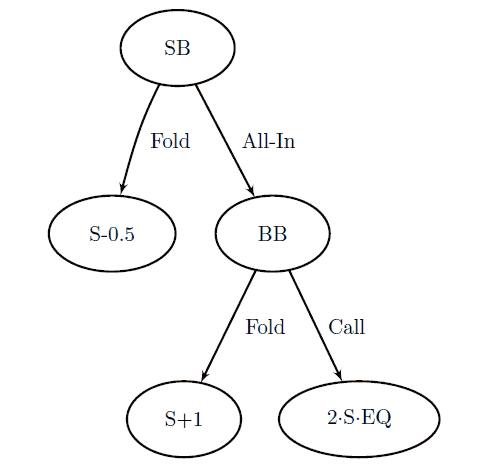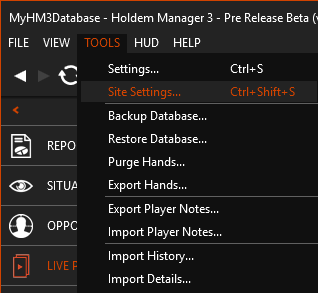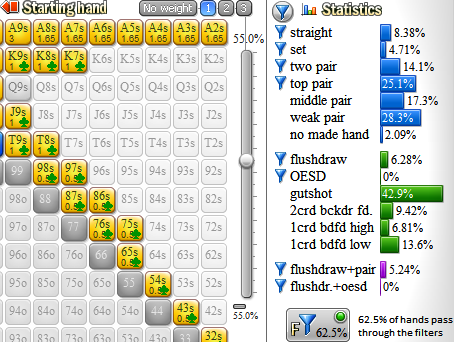Holdem Eq

Nash equilibrium is one of the most ubiquitous terms in game theory. It's used everywhere from meetings in small companies through poker strategy materials to the movie 'A Beautiful Mind'. The term gets its name from John Forbes Nash, Jr. a brilliant scientist responsible for many breakthroughs in economics, mathematics and game theory. Basic understanding of the Nash equilibrium can be invaluable in any non-cooperative game involving two or more players and poker certainly falls under that definition.
Game Theory
Let's start with a brief explanation of the game theory. According to the official definition, game theory is 'the study of mathematical models of conflict and cooperation between intelligent rational decision-makers'. It's the study of human behaviour in strategic settings that has wide applications in economics, psychology, computer science, poker etc. Now that we know what game theory is let's take a step back and figure out what constitutes a 'game'. To have a game you need at least two players, some incentives to play the game (clearly defined outcomes for the players) and rules.
Perform calculations of different levels of complexity with the freeware application for Windows supporting weight handling, suit selection options, range data import from Flopzilla, etc. It provides the option to show equities of individual hands in both a graph and a table. HoldEq is a free-to-use equity calculator for Windows OS.
Holdem Eq Card Game
Nash Equilibrium
- Building EQ Tool The aim of the project Building EQ is to support the introduction of both: the. DOWNLOAD; Blue Cat's Parametr'EQ DX Demo Blue Cat's Parametr'EQ is a 7 bands parametric equalizer combining the.
- Holdem Manager will try and fail to import these hands when the new hand history format is not recognized yet by HM3. To fix these types of errors, reimport the hands again from a new folder (Step 3 Below) once Holdem Manager 3 has the updated file format information in the latest release of HM3.
Another official definition tells us that 'In game theory, the Nash equilibrium is a solution concept of a non-cooperative game involving two or more players, in which each player is assumed to know the equilibrium strategies of the other players, and no player has anything to gain by changing only their own strategy.' In the poker context, it basically means that there's no point in playing anything but the game theory optimal strategy if we know our opponent is also playing a game theory optimal strategy since we can't exploit the GTO strategy.
Real Life Example
To further simplify the idea of Nash equilibrium, let's look at a classic example of prisoner's dilemma. In the hypothetical situation, two people are questioned separately about a crime they both committed. If they both confess to committing the crime they will spend 8 years in prison. If they both decide to keep quiet they will get locked up for a year on some minor charges. If the first player decides to confess (giving up his 'friend' in the process) and the second one lies, the first one will walk free and the first one will spend 10 years in prison (and vice versa).
As a poker player, you can easily determine the best strategy in this situation. It makes the most sense to confess since both risk and reward of that play are higher for you than the alternative regardless of the other player's choice. In this particular example confessing is the Nash equilibrium since if we knew that the other player will confess we can't punish him for that play by changing our strategy, we can only punish ourselves. Of course, lying would be better for the group but poker is not exactly a group activity and that's outside of the scope of this article.
Nash Equilibrium HU Poker Chart
6+ Holdem Equity Calculator
Poker is a very, very complicated game. Much more so than the hypothetical situation described above. That's why we still haven't figured out the game theory optimal strategy even for less complicated formats like HU Limit Hold'em (though we're somewhat close in this particular case) and judging from how fast processing power of computers increase from year to year, this won't happen anytime soon for the more complicated formats like 6-max or 9-max Holdem/PLO. However, if we greatly simplified the game and assumed that players in a HU game can only go all-in or fold in the SB position and call or fold in the BB position we can determine the nash equilibrium for that situation:
Hold'em Equity Calculator

Imagine a player who's on extreme tilt near the end of your head's up match and decides to push every hand. We can call that player with a much wider range than Nash equilibrium would suggest. Conversely, if an extremely nitty recreational player is only willing to push premium pocket pairs no matter the stack size we also shouldn't stick with blindly following the Nash equilibrium table and instead punish his narrow hand selection with frequent small raises.

What is Nash Equilibrium Good for Then When it Comes to Playing Poker?
It's valuable in a couple of ways. It can serve as a baseline for our strategy. As the number of meaningful choices we can make in the game decreases (in the context of poker game this will happen as the stack to pot ratio decreases) it makes more sense to actually follow the equilibrium. While even in today's games we can still exploit players in HU even with stacks as low as 8-10 BB's it's actually not a bad rule of thumb to start using the Nash equilibrium table as our stack reaches that point, especially when we're just starting out or we're playing against a tough competition.
More Top Rated Content

Articles
- How to Make a Poker Schedule - Tools You Can Use
- Motivational YouTube Videos - Friend or Foe?
- How to Get in the Zone and Play Your Best Poker
Coaching Videos
Holdem Eq
- Optimizing Sleep for Poker Success
- Hypnotherapy in Poker
Most of you have probably heard something about game theory, a topic some poker players have gotten curious about and studied. If you're one of those players, you might also have heard of 'Nash equilibrium,' which is a concept that comes out of game theory.
'Nash equilibrum' is named after a mathematician named John Forbes Nash, Jr. who came up with the idea during the middle of the 20th century. Here is a definition:
'If each player has chosen a strategy and no player can benefit by changing strategies while the other players keep theirs unchanged, then the current set of strategy choices and the corresponding payoffs constitute a Nash equilibrium.'
Nash proved that if we allow mixed strategies, then every game with a finite number of players in which each player can choose from finitely many pure strategies has at least one Nash equilibrium. Do you follow? That means within any game if there are a finite number of strategies available, there's at least one combination where the strategies chosen will create a Nash equilibrium.
If you think about it, that means that every poker situation and poker in general has its own Nash equilibrium. In theory, if everyone plays perfectly, even no-limit hold'em is a solved game.
Should we start panicking? No, not yet.
First of all, there is a huge difference between knowing there is a Nash equilibrium and finding one. Right now we are able to find Nash equilibriums only in the easiest spots in NLHE -- say in a heads-up 'pushbot' (all in or fold) game, or when looking specifically at our river bet-call strategy. But it's getting too complicated if we try to do it in a harder spot -- indeed, in most spots.
Let's look at a small example.
We are playing three-handed, and only two players make the money. The blinds are 120/240. One player has 3,000 chips, we have 2,000, and a third player has just one chip.
The guy with one chip is on the button and he folds. We are in the small blind. Nash equilibrium here would be to push ~13% for us and the big blind to call ~7.5%. Ranges are that tight, because you don't want to bust out before the one-chip guy. But let's say guy in the big blind is a huge fish who would call us with [7][6]-suited and hands like that. That move is very unprofitable for him, but it's also very unprofitable for us -- to the point where our push becomes very, very negative EV.
The winner in this situation? That guy with one chip who folded. He is getting tons of value despite having just one chip and folding first to act.
As this example shows, using the range from Nash equilibrium does not guarantee you profit or even to break even. That's the most widespread misconception about 'GTO' or game theory optimal play -- that there exists an 'ideal' strategy that guarantees you at least breaking even, no matter how your opponents play. As we've seen that's not the case, because Nash equilibrium only works if everyone is playing perfectly. In fact, if someone is not playing perfectly and making mistakes, that can affect you in a negative way.
So don't worry... :) Poker will always be the game we love, a game where you constantly have to adapt to what others do. A game in which no 'secret math strategy that beats everything' exists.
Ivan Demidov is a member of Team PokerStars Pro